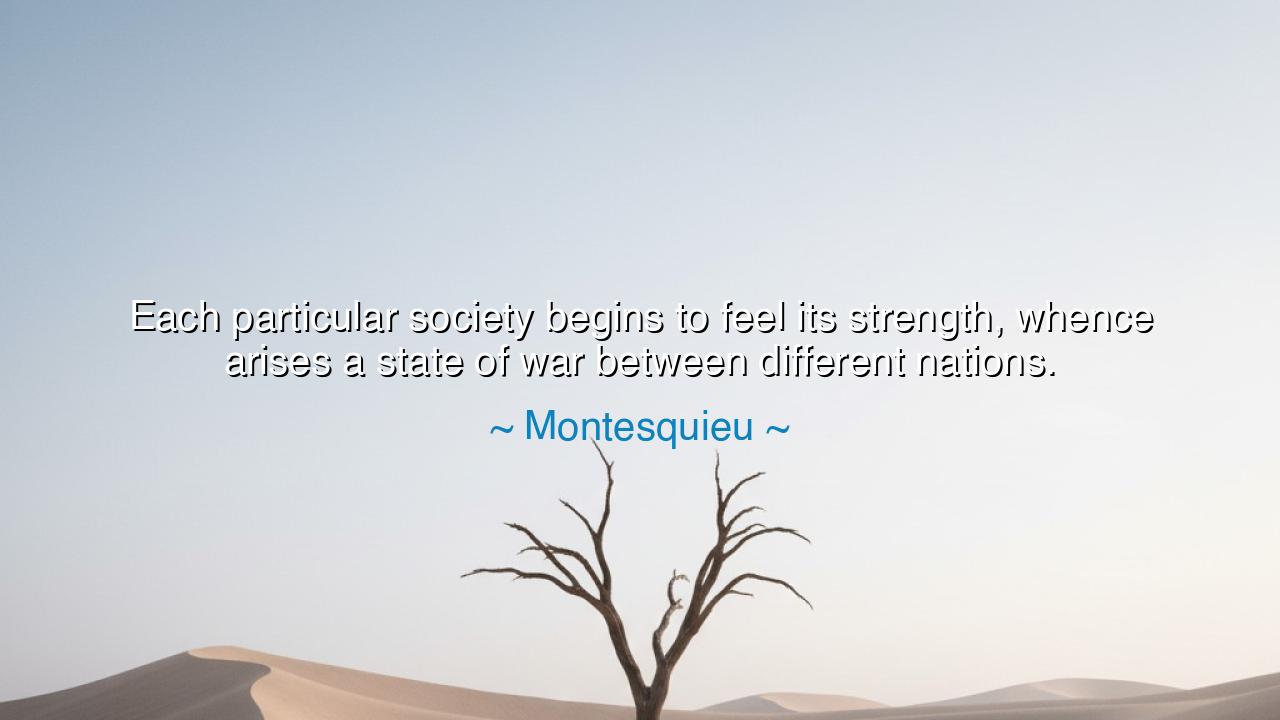
Each particular society begins to feel its strength, whence
Each particular society begins to feel its strength, whence arises a state of war between different nations.






Hear now the solemn words of Montesquieu, philosopher of nations: “Each particular society begins to feel its strength, whence arises a state of war between different nations.” These words pierce through the illusions of peace and prosperity, revealing a truth as ancient as mankind itself. When a people awakens to its strength, when it perceives its power and potential, it is stirred with pride, ambition, and desire. And from this awakening springs conflict, for strength rarely lies dormant; it seeks to expand, to prove itself, to test the boundaries of others. Thus, the rise of societies often carries with it the shadow of war.
From the dawn of history, this pattern has repeated. The tribes of old, once content with their fields and flocks, discovered new weapons, new organization, new unity—and soon clashed with neighbors who stood in their path. Strength calls to strength, and the clash resounds across generations. The state of war that Montesquieu describes is not always chosen, but is born of fear and rivalry. When one society grows strong, another trembles, and from trembling comes suspicion, and from suspicion, the spark of conflict.
Consider the story of Athens and Sparta in the age of Greece. Athens, radiant with democracy, wealth, and naval power, began to feel the might of its empire. Sparta, stern and disciplined, felt threatened by Athenian ambition. Thus was born the Peloponnesian War, a struggle not merely of armies, but of two visions of life itself. The war dragged on for decades, consuming both, until Greece lay weakened, open to conquest by Macedon. Here the words of Montesquieu ring true: the strength of each society, untempered by restraint, brought about ruin for all.
And yet, this truth extends beyond Greece. The rise of Rome, the unification of Germany under Bismarck, the industrial might of Britain—each time a society felt its strength, war followed in its wake. Sometimes it was a war of expansion, sometimes a war of defense, but always the same seed lay at the root: the awakening of power, and the fear it inspired in others. Montesquieu, in his wisdom, saw this cycle clearly, and gave it voice so that generations might learn.
But what lesson should we draw, O seeker of wisdom? Is strength itself evil? No. For strength, rightly guided, protects, uplifts, and secures peace. The danger lies in pride and blindness, when societies forget that true greatness is not proven by conquest, but by the wisdom to wield power without arrogance. The state of war arises not merely from strength, but from the misuse of it—from ambition unchecked by humility, and rivalry unchecked by reason.
Therefore, let us apply this truth not only to nations, but to our own lives. Each of us, as we grow in knowledge, skill, and influence, begins to feel our strength. And here, too, conflict may arise—with neighbors, with rivals, even with those we love—if we allow pride to rule our power. But if we temper strength with patience, if we wield it with compassion and wisdom, then what could bring war may instead bring harmony. Just as nations must learn restraint to avoid destruction, so must we master ourselves to avoid needless strife.
So let this be your action: when you feel your strength, do not rush to display it, but ask, “How can I use this to build rather than destroy?” Seek cooperation before rivalry, peace before war, humility before pride. In this way, you will rise above the endless cycle that Montesquieu described. For though societies may fall to war when they feel their power, the wise man, and the wise people, will channel power into peace.
Thus is the teaching: the discovery of strength is both a blessing and a peril. It can guard life, or it can destroy it. Montesquieu’s words are a warning across the ages—that unless strength is tempered by wisdom, it will always lead to conflict. But if you learn to guide it, then strength will not divide, but unite, and from it will grow not the clash of nations, but the harmony of humanity.






AAdministratorAdministrator
Welcome, honored guests. Please leave a comment, we will respond soon